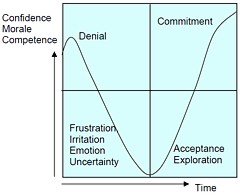Wellbeing
This is a synopsis of what I said at my talk December 1 2011 to the UCL Crucible Centre’s Café Scientifique group. |It was, in part, part of the UCL "Grand Challenge of Human Wellbeing". The aim was to discuss whether wellbeing could be measured, and whether there was any feasible way to improve it. Short version of the answer is, I fear, no and no.
Part of what I said has already appeared in the British Medical Journal, and on this blog: The A to Z of the Wellbeing Industry: from angelic reiki to patient-centred care.. Some of the new stuff seems worth noting here. I apologise in advance if some parts seems overcritical of UCL. I suspect it is just as bad everywhere else, but I can write only about what I know.
I’d better start as I did last time
Nobody could possibly be against wellbeing. It would be like opposing motherhood and apple pie. There is a whole spectrum of activities under the wellbeing banner, from the undoubtedly well-meaning patient-centred care at one end, to downright barmy new-age claptrap at the other end. The only question that really matters is, how much of it works?
The night before the meeting there were some relevant exchanges on Twitter. I’m with Margaret McCartney. The word wellbeing has been stolen for the purposes of making money. There is often about as much interest in finding out what works as there is in alternative medicine. Expect more of it under the present government.
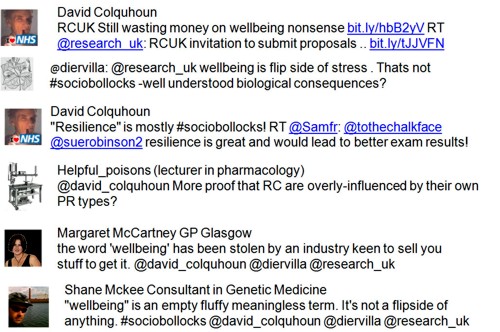
Questionnaires
Not long after the talk, a relevant piece appeared in Times Higher education, on 15 December. it was by my colleague, Adrain Furnham (professor of psychology at UCL). Doubtless it was brought on by the barrage of emails badgering us to fill in the latest staff survey (I did). Two quotations give the flavour.
Where’s the ticked-off box?
"The staff survey is, of course, the province of the most hated, loathed and despised department in the university – human resources. The survey-wallahs go to great pains to get a good response rate. They appoint, recruit and bamboozle people into becoming survey “champions”, whose job is to get people to complete the damn thing. Nothing peeves, irks and frustrates the survey people more than a poor response rate. "
"Who sees the results? It is customary for a “client” and respondents to receive a report giving the headline results. But do these reports ever show the really bad news? Namely, the news that 87 per cent of people neither like nor respect nor trust their manager, that 74 per cent are very strongly not proud to work for the organisation, and that a staggering 94 per cent think the appraisal/performance management system is a pointless, time-wasting, bureaucratic exercise?".
Watch Barbara Ehrenreich on the positive thinking industry. She’s very good on the suggestion that positive thinking influences your fate through your immune system, It doesn’t. That’s the favourite mantra of every quack and snake oil salesman.
The YouGov poll on Happiness and Wellbeing
The YouGov poll starts with the usual unanswerable questions.
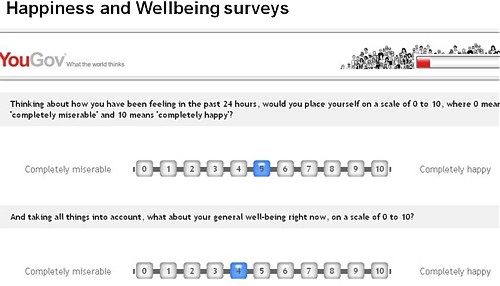
I still maintain that every day is a mixture of good and bad things. Any answer I give to questions like this is pure guesswork. At least you get to tell them what you think. The fact that on average people mark it around 7 is perhaps more a sign of guesswork than useful information.
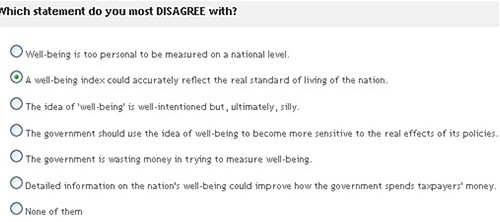
I said that I disagree most with "A wellbeing index could accurately reflect the real standard of loving of the nation", but that’s the only strong statement that was allowed: The other 6 are all either wimpy or they endorse the silliness.
UCL’s staff survey
Recently UCL got its own customer satisfaction survey. Despite repeated reminders, fewer than half the staff bothered to complete it (the day before it closed, only 28% of the Division of Biosciences had done so). I can understand why.

Just like the last time. many of the questions were infuriating, because no answer seemed satisfactory without adding qualifications, and you couldn’t do that, There was a single free text box at the end. And, guess what, what people write in it will be kept secret.
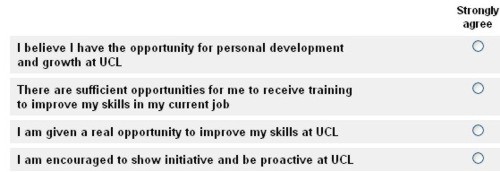
This is a very odd question to ask academics. The only course in my area is the one that I and colleagues run, unpaid and with no support from UCL. HR have done nothing that helps my understanding of stochastic processes (though academic colleagues have done a great deal). A comment, below, hits the nail on the head.
“Agree? Great, staff development are doing a good job! Disagree? Clearly you need … more staff development courses!”
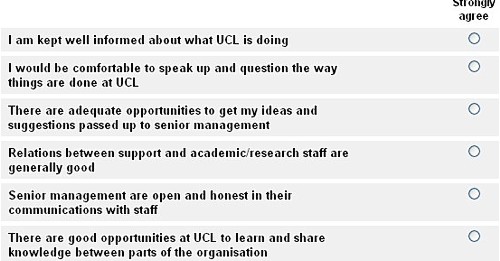
Well informed? Yes there are endless newsletters, though they increasingly read like PR rather than information.
Most people are terrified to stand up at a meeting of academic board or to vote against the senior management committee decisions (no secret votes there -you have to put up your hand). The same is true of Faculty Boards, though they have become rare. Perhaps that is why so few people go to them any longer. It will be interesting to see how this question is answered (if it is ever released).
Anyone can pass their ideas to senior management. I have done so quite often. I can’t, off-hand, think of any case where my suggestions have been acted on. I expect that is why most people don’t bother.
The question about relations between support staff and academics is equally unanswerable without qualifications. In my experience relationships have always been very good with lower rank people with whom you work and meet regularly. It is often not so good with senior adminisrators, too many of whom treat academics as a nuisance that gets in the way of their ambitions. Recent changes have probably made relations worse, because the centralisation of support staff means that you rarely know any of them personally. But there is no space on the questionnaire to say any of this.
It’s hard to answer question 5 too. There is a general perception that the main object of communication is to tell you what to do. Much of it is too vacuous to have any detectable meaning. A large amount of it is, i suspect, never read.
Question 6. The abolition of local tea rooms has reduced the ability to learn and share knoowledge. The one place we have is the Housman room. It is beyond belief that there was recently an attempt to abolish it. I gather that that threat has receded but it wasted a great deal of time to organise petitions. We are deluged with newsletters from one ‘domain’ or another, and though they have some useful information, they do not begin to compensate for face to face meetings which are now less frequent than formerly. As I wrote elsewhere, failing to waste time drinking coffee can seriously harm you career. The survey questions allow none of these things to be said.
Finally we come to ‘Overall perceptions’.
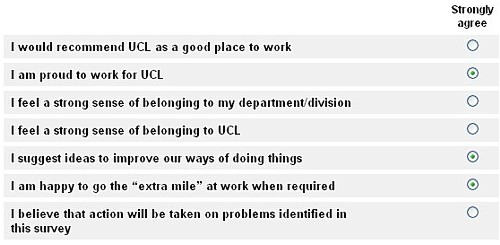
These are the hardest of all.
Yes, I’d recommend UCL as a good place to work, certainly better than Imperial. On the other hand it’s not as good as it was. One now meets colleagues less than at any time in the past. When you enter what used to be my department, you are greeted with a sea of locked doors. No office, no pigeon holes. no tea room. At times it feels as though you might as well be working on an assembly line in a car factory.
Am i proud to work for UCL?. Yes, very, at one level. It’s my sort of place. I couldn’t stand the flummery of Oxbridge, and godless heritage of UCL is perfect for me. But am I proud of some of the recent changes? No, I am not. There is, of course, no chance to explain these subtleties.
Question 3 is easy. Which department? My department was abolished, despite being the oldest in England, and consistently getting top ratings. Its morale used to make a wonderful working environment. .It’s hard to generate much sense of belonging to a huge grouping with a catchy name like NPP (that’s neuroscience. physiology and pharmacology), most of whose members you have never met. The separation of teaching from research has also reduced any sense of cohesiveness.
As for the last question, you must be joking.
Wellbeing and resilience at work
That’s the title of a web page from UCL’s occupational health people.
"Wellbeing is not just about being happy; it is also about having the resilience to deal effectively with change and unpredictability. We can all develop skills to help us when things are not going as well as we hope or expect."
When you click on the questionnaire you are taken to the absurdly long (195 questions) Robertson-Cooper resilience questionnaire, about which I already wrote a bit. You’d need a lot of resilience to finish it and would probably learn very little.
You are directed then to "useful tools" for improving your wellbeing and resilience. These too are outsourced, to the International Stress Management Association.

Let’s look at their valuable advice.
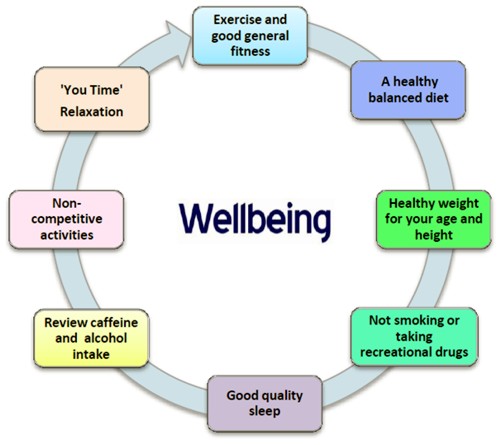
|
This is the sort of advice that’s thrust down your throat at every turn. It’s puerile and condescending to present us with diagram like that. I love the way that coffee is categorised with alcohol. That’s nothing short of pure quackery. The sort of thing you might have expected from a graduate in "nutrtitional therapy" (before Westminster closed it down). |
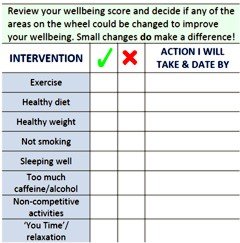
|
The resilience diagram is equally peurile.
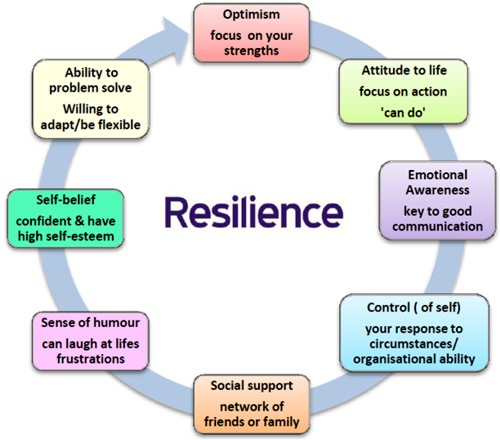
It’s hard to escape being lectured about wellbeing. It’s turned into a major soure of bullying and harassment. The best thing that could be done for my wellbeing is for the self-styled experts to get a proper job.
The UCL Grand Challenge in Human Wellbeing
This rather grand sounding project is one of the five Grand Challenges. They are, I think, well-meaning (though the more cynical views that I hear suggest that they are designed to get money from Bill Gates’ Foundation).
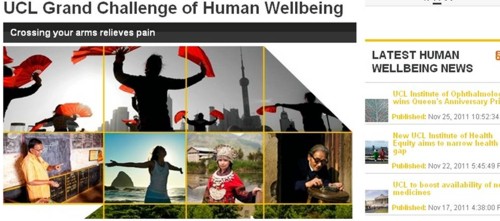
Quite a lot of money has been spent on them. So one must ask whether they have resulted in any work being done that would not have been done without paying a large salary to a "Director of Grand Challenges". Have they produced enough to compensate for the embarrassment engendered by the pretentious-sounding name?
The list of projects is interesting. Some are worthy enough, but would probably have happened anyway. None are particularly interdisciplinary, despite that being one of the alleged advantages. More to the point though, some of them seem to have little chance of contributing to anyone’s happiness.
One good one is run by Michael Marmot.

This is the sort of thing that Marmot is very good at. It doesn’t need a “Grand Challenge”. Marmot talked about it at the Café Scientifique on 5 Jan 2012. It was a really good talk. Of course it isn’t likely that it will actually achieve much, not least with Andrew Lansley as Health Secretary, but I wish them well. It’s very good that they are trying.
The Wellbeing intervention study.
This study will measure subjective wellbeing and salivary cortisol after two sorts of writing exercise. it will be randomised, but not blind. So, if there is any effect at all, it will have a better chance of establishing causality than most of the "trials" that HEFCE is paying Robertson-Cooper to do. What is much less obvious is how the results could be used, even in the unlikely event that one writing exercise made people happier or less-stressed than the other.
The body scanner project: wellbeing UCL.org
Although wellbeingUCL.org sounds like a UCL thing, the domain is registered at the home address of the UCL person who invented a 3D body scanner.
|
So far this interesting gadget has been used by the clothing industry. Now it is being offered to UCL people, as "a ‘proof-of-concept’ for national Wellbeing surveys”. Its certainly heavily sponsored. Before going into the scanner you are invited to do yet another questionnaire. The questions strike me as a bit odd, There are endless web sites that offer to manage wellbeing, Why Boots? Well they do happen to be a sponsor. I;m not sure that that’s a good idea, Boots are notorious for selling fraudulent "wellbeing" products such as "detox" nonsense and vitamin pills. |
 |
Boots are constantly being reprimanded by the Advertising Standards Authority, most recently over their advertising of homeopathic pills
.Here is a sample from the questionnaire.

And as for the idea that most academics can afford, or would want, a personal trainer. Word fail me.
The scanner is an interesting machine, but even its promoters don’t seem to have much idea what it could do for your wellbeing.
The museum object therapy study.
This is based on the somewhat unlikely premise that holding a museum object will make you feel better.
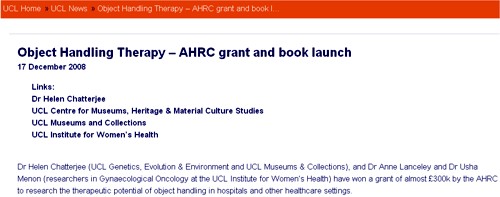
The AHRC gave a grant of £300,000 to test the idea. There were controls (in the form of photographs of the objects rather than the objects themselves), But as the authors themselves recognise, the design of the study did not allow any firm conclusions to be drawn. It’s really rather like the endless indecisive pilot studies that litter the world of alternative medicine. They usually show promising results, but the promise somehow never get confirmed if the study is done properly. But what really baffles me is what use it would be even if the results were positive? Would we see hospital wards overrun with museum people thrusting ancient objects into the hands of sick patients? If so, make mine a machete.
I can’t believe this is a good way to spend £300,000.
Conclusion
Wellbeing sounds good, but a lot of money is being spent on things that won’t improve it.
If you universities really wanted to improve wellbeing they would listen to Michael Marmot, and stop disempowering their employees.
This is a slightly-modified version of the article that appeared in BMJ blogs yesterday, but with more links to original sources, and a picture. There are already some comments in the BMJ.
The original article, diplomatically, did not link directly to UCL’s Grand Challenge of Human Wellbeing, a well-meaning initiative which, I suspect, will not prove to be value for money when it comes to practical action.
Neither, when referring to the bad effects of disempowerment on human wellbeing (as elucidated by, among others, UCL’s Michael Marmot), did I mention the several ways in which staff have been disempowered and rendered voiceless at UCL during the last five years. Although these actions have undoubtedly had a bad effect on the wellbeing of UCL’s staff, it seemed a litlle unfair to single out UCL since similar things are happening in most universities. Indeed the fact that it has been far worse at Imperial College (at least in medicine) has probably saved UCL from being denuded. One must be thankful for small mercies.
There is, i think, a lesson to be learned from the fact that formal initiatives in wellbeing are springing up at a time when university managers are set on taking actions that have exactly the opposite effect. A ‘change manager’ is not an adequate substitute for a vote. Who do they imagine is being fooled?
The A to Z of the wellbeing industry
From angelic reiki to patient-centred care
Nobody could possibly be against wellbeing. It would be like opposing motherhood and apple pie. There is a whole spectrum of activities under the wellbeing banner, from the undoubtedly well-meaning patient-centred care at one end, to downright barmy new-age claptrap at the other end. The only question that really matters is, how much of it works?
Let’s start at the fruitcake end of the spectrum.
One thing is obvious. Wellbeing is big business. And if it is no more than a branch of the multi-billion-dollar positive-thinking industry, save your money and get on with your life.
In June 2010, Northamptonshire NHS Foundation Trust sponsored a “Festival of Wellbeing” that included a complementary therapy taster day. In a BBC interview one practitioner used the advertising opportunity, paid for by the NHS, to say “I’m an angelic reiki master teacher and also an angel therapist.” “Angels are just flying spirits, 100 percent just pure light from heaven. They are all around us. Everybody has a guardian angel.” Another said “I am a member of the British Society of Dowsers and use a crystal pendulum to dowse in treatment sessions. Sessions may include a combination of meditation, colour breathing, crystals, colour scarves, and use of a light box.” You couldn’t make it up.
The enormous positive-thinking industry is no better. Barbara Ehrenreich’s book, Smile Or Die: How Positive Thinking Fooled America and the World, explains how dangerous the industry is, because, as much as guardian angels, it is based on myth and delusion. It simply doesn’t work (except for those who make fortunes by promoting it). She argues that it fosters the sort of delusion that gave us the financial crisis (and pessimistic bankers were fired for being right). Her interest in the industry started when she was diagnosed with cancer. She says
”When I was diagnosed, what I found was constant exhortations to be positive, to be cheerful, to even embrace the disease as if it were a gift. If that’s a gift, take me off your Christmas list,”
It is quite clear that positive thinking does nothing whatsoever to prolong your life (Schofield et al 2004; Coyne et al 2007; 2,3), any more than it will cure tuberculosis or cholera. “Encouraging patients to “be positive” only may add to the burden of having cancer while providing little benefit” (Schofield et al 2004). Far from being helpful, it can be rather cruel.
Just about every government department, the NHS, BIS, HEFCE, and NICE, has produced long reports on wellbeing and stress at work. It’s well known that income is correlated strongly with health (Marmot, M., 2004). For every tube stop you go east of Westminster you lose a year of life expectancy (London Health Observatory). It’s been proposed that what matters is inequality of income (Wilkinson & Pickett, 2009). The nature of the evidence doesn’t allow such a firm conclusion (Lynch et al. 2004), but that isn’t really the point. The real problem is that nobody has come up with good solutions. Sadly the recommendations at the ends of all these reports don’t amount to a hill of beans. Nobody knows what to do, partly because pilot studies are rarely randomised so causality is always dubious, and partly because the obvious steps are either managerially inconvenient, ideologically unacceptable, or too expensive.
Take two examples:
Sir Michael Marmot’s famous Whitehall study (Marmot, M., 2004) has shown that a major correlate of illness is lack of control over one’s own fate: disempowerment. What has been done about it?
In universities it has proved useful to managers to increase centralisation and to disempower academics, precisely the opposite of what Marmot recommends.
|
As long as it’s convenient to managers they are not going to change policy. Rather, they hand the job to the HR department which appoints highly paid “change managers,” who add to the stress by sending you stupid graphs that show you emerging from the slough of despond into eternal light once you realise that you really wanted to be disempowered after all. Or they send you on some silly “resilience” course. |
|
A second example comes from debt. According to a BIS report (Mental Capital and Wellbeing), debt is an even stronger risk factor for mental disorder than low income. So what is the government’s response to that? To treble tuition fees to ensure that almost all graduates will stay in debt for most of their lifetime. And this was done despite the fact that the £9k fees will save nothing for the taxpayer: in fact they’ll cost more than the £3k fees. The rise has happened, presumably, because the ideological reasons overrode the government’s own ideas on how to make people happy.
Nothing illustrates better the futility of the wellbeing industry than the response that is reported to have been given to a reporter who posed as an applicant for a “health, safety, and wellbeing adviser” with a local council. When he asked what “wellbeing” advice would involve, a member of the council’s human resources team said: “We are not really sure yet as we have only just added that to the role. We’ll want someone to make sure that staff take breaks, go for walks — that kind of stuff.”
The latest wellbeing notion to re-emerge is the happiness survey. Jeremy Bentham advocated “the greatest happiness for the greatest number,” but neglected to say how you measure it. A YouGov poll asks, “what about your general well-being right now, on a scale from 1 to 10.” I have not the slightest idea about how to answer such a question. As always some things are good, some are bad, and anyway wellbeing relative to whom? Writing this is fun. Trying to solve an algebraic problem is fun. Constant battling with university management in order to be able to do these things is not fun. The whole exercise smacks of the sort of intellectual arrogance that led psychologists in the 1930s to claim that they could sum up a person’s intelligence in a single number. That claim was wrong and it did great social harm.
HEFCE has spent a large amount of money setting up “pilot studies” of wellbeing in nine universities. Only one is randomised, so there will be no evidence for causality. The design of the pilots is contracted to a private company, Robertson Cooper, which declines to give full details but it seems likely that the results will be about as useless as the notorious Durham fish oil “trials”(Goldacre, 2008).
Lastly we get to the sensible end of the spectrum: patient-centred care. Again this has turned into an industry with endless meetings and reports and very few conclusions. Epstein & Street (2011) say
“Helping patients to be more active in consultations changes centuries of physician-dominated dialogues to those that engage patients as active participants. Training physicians to be more mindful, informative, and empathic transforms their role from one characterized by authority to one that has the goals of partnership, solidarity, empathy, and collaboration.”
That’s fine, but the question that is constantly avoided is what happens when a patient with metastatic breast cancer expresses a strong preference for Vitamin C or Gerson therapy, as advocated by the YesToLife charity. The fact of the matter is that the relationship can’t be equal when one party, usually (but not invariably) the doctor, knows a lot more about the problem than the other.
What really matters above all to patients is getting better. Anyone in their right mind would prefer a grumpy condescending doctor who correctly diagnoses their tumour, to an empathetic doctor who misses it. It’s fine for medical students to learn social skills but there is a real danger of so much time being spent on it that they can no longer make a correct diagnosis. Put another way, there is confusion between caring and curing. It is curing that matters most to patients. It is this confusion that forms the basis of the bait and switch tactics (see also here) used by magic medicine advocates to gain the respectability that they crave but rarely deserve.
If, as is only too often the case, the patient can’t be cured, then certainly they should be cared for. That’s a moral obligation when medicine fails in its primary aim. There is a lot of talk about individualised care. It is a buzzword of quacks and also of the libertarian wing which says NICE is too prescriptive. It sounds great, but it helps only if the individualised treatment actually works.
Nobody knows how often medicine fails to be “patient-centred.”. Even less does anyone know whether patient-centred care can improve the actual health of patients. There is a strong tendency to do small pilot trials that are as likely to mislead as inform. One properly randomised trial (Kinmonth et al., 1998) concluded
“those committed to achieving the benefits of patient centred consulting should not lose the focus on disease management.”
Non-randomised studies may produce more optimistic conclusions (e.g. Hojat et al, 2011), but there is no way to tell if this is simply because doctors find it easy to be empathetic with patients who have better outcomes.
Obviously I’m in favour of doctors being nice to patients and to listening to their wishes. But there is a real danger that it will be seen as more important than curing. There is also a real danger that it will open the doors to all sorts of quacks who claim to provide individualised empathic treatment, but end up recommending Gerson therapy for metastatic breast cancer. The new College of Medicine, which in reality is simply a reincarnation of the late unlamented Prince’s Foundation for Integrated Health, lists as its founder Capita, the private healthcare provider that will, no doubt, be happy to back the herbalists and homeopaths in the College of Medicine, and, no doubt, to make a profit from selling their wares to the NHS.
In my own experience as a patient, there is not nearly as much of a problem with patient centred care as the industry makes out. Others have been less lucky, as shown by the mid-Staffordshire disaster (Delamothe, 2010), That seems to have resulted from PR being given priority over patients. Perhaps all that’s needed is to save money on all the endless reports and meetings (“the best substitute for work”), ban use of PR agencies (paid lying) and to spend the money on more doctors and nurses so they can give time to people who need it. This is a job that will be hindered considerably by the government’s proposals to sell off NHS work to private providers who will be happy to make money from junk medicine.
Reference
Wilkinson. R & Pickett, K. 2009 , The Spirit Level, ISBN 978 1 84614 039 6
A footnote on Robertson Cooper and "resilience"
I took up the offer of Robertson Cooper to do their free "resilience" assessment, the company to which HEFCE has paid an undisclosed amount of money.

The first problem arose when it asked about your job. There was no option for scientist, mathematician, university or research, so I was forced to choose "education and training". (a funny juxtaposition since training is arguably the antithesis of education). It had 195 questions. mostly as unanswerable as in the YouGov happiness survey. I particularly liked question 124 "I see little point in many of the theoretical models I come across". The theoretical models that I come across most are Markov models for the intramolecular changes in a receptor molecule when it binds a ligand (try, for example, Joint distributions of apparent open and shut times of single-ion channels and maximum likelihood fitting of mechanisms). I doubt the person who wrote the question has ever heard of a model of that sort. The answer to that question (and most of the others) would not be worth the paper they are written on.
The whole exercise struck me as the worst sort of vacuous HR psychobabble. It is worrying that HEFCE thinks it is worth spending money on it.
Follow-up
It is almost six months now since I posted Quackery creeps into good universities too -but through Human Resources. One example given there was the University of Leicester. This is an excellent university. It does first class research and it was the alma mater of the incomparable David Attenborough who has done more than anyone to show us the true beauty and wonder of the natural world.
Nevertheless, their well-meaning occupational health department had a section about “complementary therapies” that contained a lot of statements that were demonstrably untrue. They even recommended the utterly outrageous SCENAR device. So I pointed this out to them, and I had a quick and sympathetic response from their HR director.
But three months later, nothing had changed. Every now and then, I’d send a polite reminder, but it seemed the occupational health staff were very wedded to their quackery. The last reminder went on 6th February, but this time I copied it to Leicester’s vice-chancellor. This time it worked. There is still a link to Complementary Therapies on the Wellbeing site, but if you click on it, this is what you see.
Complementary therapiesSome employees may have an interest in complementary therapies such as acupuncture, yoga, Indian head massage, Reiki, sports & remedial massage, reflexology and hypnotherapy. If you have an interest in any of these, Staff Counselling can happily provide details of practitioners in the local area. Some of these practitioners offer discounts from their normal rates for University of Leicester staff. However, the University of Leicester cannot vouch for, or recommend any of these therapies to staff as being effective. We would urge members of staff who believe that such therapies might be effective to contact their GP prior to undertaking any of them. Further, the University of Leicester shall not be liable for any damage of any kind arising out of or related to the services of any complementary therapists or treatments listed here. If you would like further information, please contact Chris Wilson at: staffcounsel&welfare@le.ac.uk or telephone 1702. |
That’s not bad. Pity it doesn’t say alternative, rather than complementary though. Euphemisms aren’t really helpful.
In fact I have a bit of a problem with “wellbeing” too. It is a harmless word that has been highjacked so that its use now makes one think of mud baths provided by expensive hotels for their rich and gullible customers.
Leicester’s HR director wrote
“Unfortunately an instruction I had given previously had not been fully complied with. I spoke to the manager of the Staff Counselling team on Friday and gave clear instructions as to the content of this site. I had been assured that the offending information had been removed, but found that it had not.
I have now checked the site for myself and can say, with confidence, that all claims for the efficacy of complimentary [sic] therapies have been removed including SCENAR.”
The similarity between quack treatments and religion is intriguing. It seems that the devotion of the occupational health people to their baloney was so great that they wouldn’t take it down even when told to do so. The more irrational the belief, the greater the fervour with which it is defended,
What’s the lesson from this minor saga? It seems that most VCs and many HR people are too sensible to believe in alternative baloney, but that they are a bit too ready to tolerate it, perhaps on grounds of political correctness. Tolerance is a virtue, but lies about health are not in the least virtuous. If you point out that people are saying things for which there isn’t the slightest evidence, they will often respond. Just be prepared to send a few reminders.
It may also be useful to point out that some of the claims made are almost certainly illegal. Even people who care little about evidence of efficacy are impressed by the idea that they might be prosecuted by Trading Standards officers.
Who needs mystical medicine when you have real wonders like these.
(Click the google video logo for a bigger version)
Or try the pitcher plant video, or the Bird of paradise, or the Bower Bird, or the giant Amazon lilies.


